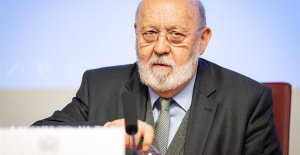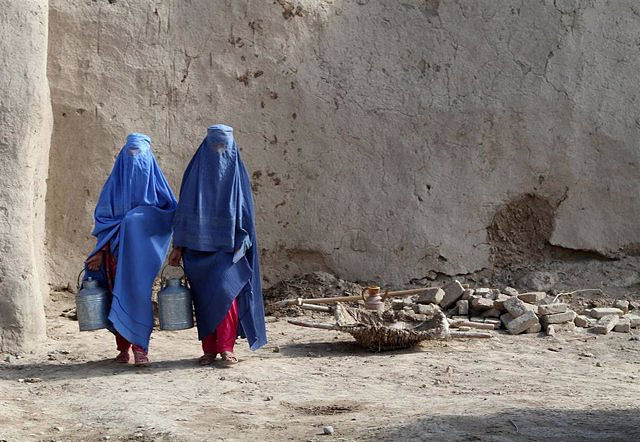Alert of the "alarming" figures of female students excluded from school during the last three years
MADRID, 31 Ene. (EUROPA PRESS) -
The United Nations Children's Fund (UNICEF) has called for the "full inclusion" of Afghan women and girls in public life and has warned of the "alarming" numbers of female students excluded from school due to the restrictions imposed by the Taliban in Afghanistan.
The agency's deputy executive director, Omar Abdi, has stressed that in addition to calling for the repeal of the ban on women working for non-governmental organizations, UNICEF has asked the Taliban "for the full inclusion of girls and women in public life, and especially in public secondary education and higher education".
Thus, he pointed out that "more than a million girls who should have gone to secondary school have lost their education for three years, first due to COVID-19 and then, since September 2021, due to the ban on attending the high school".
"With the recent announcement, on December 20, of banning women's access to universities and educational centers, the hopes of Afghan girls and women to learn and work have sunk again. We are very concerned about the development of girls and women, and in particular for their mental health," she explained.
In this sense, he stressed that if secondary education classes remain closed in 2023, "it is estimated that some 215,000 girls who attended sixth grade last year will be denied, once again, their right to learn." "Despite the grim situation, the people of Afghanistan have not given up. So neither should we," she stressed.
Abdi has stressed the existence of "some positive signs", including that "an estimated 200,000 girls continue to attend secondary schools in around 12 provinces, while secondary school teachers continue to receive their salaries from the de facto authorities".
"The authorities we met with in Kabul last week reassured us that they are not against girls learning in secondary schools and have again promised to reopen the centers after their leader approves the guidelines," he said.
On the other hand, it has affected that the number of classes in community centers, which take place in private homes and public places, "has doubled from 10,000 to 20,000." "Some 600,000 children attend these classes, of which 55 percent are girls," she pointed out.
"Thanks to this type of education, it is possible to reach children who have never been to school, thanks to the access we now have to many parts of the country that were previously inaccessible due to the conflict," he said, before stressing that "these Positive signs are the result of both the commitment of the de facto authorities and the pressure of local communities to keep schools and community classes open."
"As long as communities continue to demand education, we must continue to support both public education and other forms of education: community education classes, remedial classes, and vocational training. Without education there is little hope for a better future for the girls and women of Afghanistan." , has riveted.
Abdi's statements come days after the Taliban ordered the country's universities, both public and private, to prohibit students from accessing this year's selectivity test.
This new order amplifies the initial restriction of the Taliban authorities, announced in December, which strictly prohibited women's access to university higher education until further notice, in a decision that earned the fundamentalist movement a wave of international criticism.

 Exploring Cardano: Inner Workings and Advantages of this Cryptocurrency
Exploring Cardano: Inner Workings and Advantages of this Cryptocurrency Seville.- Economy.- Innova.- STSA inaugurates its new painting and sealing hangar in San Pablo, for 18 million
Seville.- Economy.- Innova.- STSA inaugurates its new painting and sealing hangar in San Pablo, for 18 million Innova.- More than 300 volunteers join the Andalucía Compromiso Digital network in one month to facilitate access to ICT
Innova.- More than 300 volunteers join the Andalucía Compromiso Digital network in one month to facilitate access to ICT Innova.-AMP.- Ayesa acquires 51% of Sadiel, which will create new technological engineering products and expand markets
Innova.-AMP.- Ayesa acquires 51% of Sadiel, which will create new technological engineering products and expand markets The PP sees the concentration of support for Sánchez in Ferraz as a "failure" and believes that it "complicates" the story of its continuity
The PP sees the concentration of support for Sánchez in Ferraz as a "failure" and believes that it "complicates" the story of its continuity Marc Márquez returns to pole in Jerez
Marc Márquez returns to pole in Jerez The CIS carries out a quick survey on Sánchez's letter to measure the reaction of citizens
The CIS carries out a quick survey on Sánchez's letter to measure the reaction of citizens 12M.- Puigdemont to Sánchez and Illa: "This is not about the future of the PSOE! What have you believed?"
12M.- Puigdemont to Sánchez and Illa: "This is not about the future of the PSOE! What have you believed?" How Blockchain in being used to shape the future
How Blockchain in being used to shape the future Not just BTC and ETH: Here Are Some More Interesting Coins Worth Focusing on
Not just BTC and ETH: Here Are Some More Interesting Coins Worth Focusing on UPV students build a prototype of a wooden house to move to Equatorial Guinea
UPV students build a prototype of a wooden house to move to Equatorial Guinea The UA opens the call for the Impulso 2024 Awards for the best innovative business initiatives
The UA opens the call for the Impulso 2024 Awards for the best innovative business initiatives ALI, virtual assistant from Alicante, internationally recognized by the OECD
ALI, virtual assistant from Alicante, internationally recognized by the OECD Retrópolis brings the golden age of video games and computing to the UPV
Retrópolis brings the golden age of video games and computing to the UPV A million people demonstrate in France against Macron's pension reform
A million people demonstrate in France against Macron's pension reform Russia launches several missiles against "critical infrastructure" in the city of Zaporizhia
Russia launches several missiles against "critical infrastructure" in the city of Zaporizhia A "procession" remembers the dead of the Calabria shipwreck as bodies continue to wash up on the shore
A "procession" remembers the dead of the Calabria shipwreck as bodies continue to wash up on the shore Prison sentences handed down for three prominent Hong Kong pro-democracy activists
Prison sentences handed down for three prominent Hong Kong pro-democracy activists ETH continues to leave trading platforms, Ethereum balance on exchanges lowest in 3 years
ETH continues to leave trading platforms, Ethereum balance on exchanges lowest in 3 years Investors invest $450 million in Consensys, Ethereum incubator now valued at $7 billion
Investors invest $450 million in Consensys, Ethereum incubator now valued at $7 billion Alchemy Integrates Ethereum L2 Product Starknet to Enhance Web3 Scalability at a Price 100x Lower Than L1 Fees
Alchemy Integrates Ethereum L2 Product Starknet to Enhance Web3 Scalability at a Price 100x Lower Than L1 Fees Mining Report: Bitcoin's Electricity Consumption Declines by 25% in Q1 2022
Mining Report: Bitcoin's Electricity Consumption Declines by 25% in Q1 2022 Oil-to-Bitcoin Mining Firm Crusoe Energy Systems Raised $505 Million
Oil-to-Bitcoin Mining Firm Crusoe Energy Systems Raised $505 Million Microbt reveals the latest Bitcoin mining rigs -- Machines produce up to 126 TH/s with custom 5nm chip design
Microbt reveals the latest Bitcoin mining rigs -- Machines produce up to 126 TH/s with custom 5nm chip design Bitcoin's Mining Difficulty Hits a Lifetime High, With More Than 90% of BTC Supply Issued
Bitcoin's Mining Difficulty Hits a Lifetime High, With More Than 90% of BTC Supply Issued The Biggest Movers are Near, EOS, and RUNE during Friday's Selloff
The Biggest Movers are Near, EOS, and RUNE during Friday's Selloff Global Markets Spooked by a Hawkish Fed and Covid, Stocks and Crypto Gain After Musk Buys Twitter
Global Markets Spooked by a Hawkish Fed and Covid, Stocks and Crypto Gain After Musk Buys Twitter Bitso to offset carbon emissions from the Trading Platform's ERC20, ETH, and BTC Transactions
Bitso to offset carbon emissions from the Trading Platform's ERC20, ETH, and BTC Transactions Draftkings Announces 2022 College Hoops NFT Selection for March Madness
Draftkings Announces 2022 College Hoops NFT Selection for March Madness























